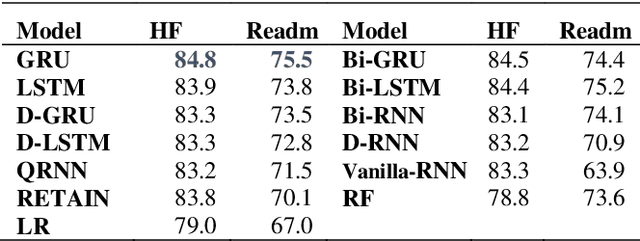Simple Recurrent Neural Networks is all we need for clinical events predictions using EHR data
Paper and Code
Oct 03, 2021
Recently, there is great interest to investigate the application of deep learning models for the prediction of clinical events using electronic health records (EHR) data. In EHR data, a patient's history is often represented as a sequence of visits, and each visit contains multiple events. As a result, deep learning models developed for sequence modeling, like recurrent neural networks (RNNs) are common architecture for EHR-based clinical events predictive models. While a large variety of RNN models were proposed in the literature, it is unclear if complex architecture innovations will offer superior predictive performance. In order to move this field forward, a rigorous evaluation of various methods is needed. In this study, we conducted a thorough benchmark of RNN architectures in modeling EHR data. We used two prediction tasks: the risk for developing heart failure and the risk of early readmission for inpatient hospitalization. We found that simple gated RNN models, including GRUs and LSTMs, often offer competitive results when properly tuned with Bayesian Optimization, which is in line with similar to findings in the natural language processing (NLP) domain. For reproducibility, Our codebase is shared at https://github.com/ZhiGroup/pytorch_ehr.
 Add to Chrome
Add to Chrome Add to Firefox
Add to Firefox Add to Edge
Add to Edge